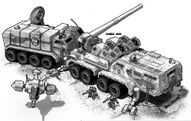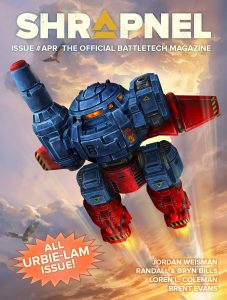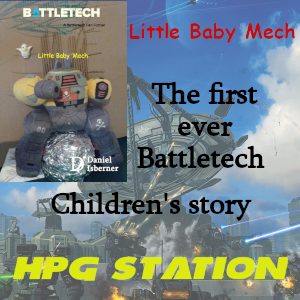Difference between revisions of "Teppō"
m (copyedits) |
|||
| Line 26: | Line 26: | ||
== Description == | == Description == | ||
| − | The '''''Teppô''''' Artillery Support Vehicle is | + | The '''''Teppô''''' Artillery Support Vehicle is an [[Experimental Technology|experimental]] Super Heavy Combat Vehicle which is designed to provide support to frontline combat units of the [[Draconis Combine]]. First produced just after the [[Jihad]], this massive vehicle was designed to be a regiment's mobile artillery battery and also provide additional command and repair abilities through its pair of Support Trailers. The Teppô's creation was as a result of the hard lessons learned from nearly two decades of fighting the [[Word of Blake]] and the [[Black Dragon Society]]. Using the [[Ryuken|Ryuken's]] [[Combined-Arms]] command style as a model, the ''Teppô'' and its support trailers would attempt to replicate the elite brigade's command capacities for other frontline Regiments. Built on [[Unity]] at [[Pesht Motors]], the ''Teppô'' is noted for its high quality due to each vehicle being hand-built.<ref name="TRO:3085Sp20+"/> |
==Weapons and Equipment== | ==Weapons and Equipment== | ||
| − | The ''Teppô'' | + | The ''Teppô's'' principal fire support weaponry includes a Ikazuchi Type 2 Sniper Artillery Piece mounted in the vehicle's turret and a pair of Shigunga Arrow IV Artillery Systems mounted in the front of the vehicle. The Vehicle's Sniper piece has three tons of ammunition while the Arrow IV launchers have six, allowing for a wide selection of artillery rounds. A Light Machine Gun is mounted in the front and rear, to protect against infantry attack. The vehicle sports three Anti-Missile Systems, one in the front and on each side of the ''Teppô''. It is protected with 20 tons of New Samarkand Royal Heavy Ferro-Fibrous armor and CASE. Among Teppô's other features include; 1 ton worth of [[Communication Equipment]], a [[Guardian ECM Suite]], and a 4 ton [[Infantry Compartment]] for the security detachment.<ref name="TRO:3085Sp20+"/> |
| − | The vehicle features a 280 rated Fuel Cell engine, allows it to move 21 kilometers hour while towing.<ref name="TRO:3085Sp20+"/> | + | The vehicle features a 280 rated Fuel Cell engine, allows it to move 21 kilometers an hour while towing.<ref name="TRO:3085Sp20+"/> |
== Support Trailers == | == Support Trailers == | ||
| − | The ''Teppô's'' two 75 ton [[Technology Rating|Advanced tech]] wheeled trailers | + | The ''Teppô's'' two 75 ton [[Technology Rating|Advanced tech]] wheeled trailers include the Tenmaku (Mobile Headquarters Trailer) and its ''Bokkusu'' (Cargo & Repair Facility).<ref name="TRO:3085Sp20+"/> |
=== Tenmaku === | === Tenmaku === | ||
| − | The ''Tenmaku'' is ''Teppô's'' Command Trailer | + | The ''Tenmaku'' is the ''Teppô's'' Command Trailer featuring its own small [[fusion engine|fusion reactor]] as an independent power source. The ''Tenmaku's'' equipment include 10 tons worth of Communication Equipment, a pair of [[C3 Computer (Master)|C3 Master Computers]], a Guardian ECM suite, 5 tons worth of [[Mission Specific Equipment]], a 10 ton Infantry Compartment capacity, and a single [[Trailer Hitch]] mounted in the front. The vehicle is armed with a pair of [[Medium Lasers]] and a pair of Light Machine Guns in its turret. Additionally, it has three Anti-Missile Systems found in the turret and on each side. The trailer is protected by 15 tons of heavy ferro-fibrous armor with CASE protection for its ammunition bins. BV (2.0)=881<ref name="TRO:3085Sp20+"/> |
=== Bokkusu === | === Bokkusu === | ||
| − | The ''Bokkusu'' trailer serves as both a mobile repair base and cargo hauler for Teppô's users. It is unpowered and | + | The ''Bokkusu'' trailer serves as both a mobile repair base and cargo hauler for the Teppô's users. It is unpowered and it is protected by 12 tons of heavy ferro-fibrous armor and CASE. The trailer's main features is its [[Mobile Field Base]], which is a self-contained repair gantry providing a comprehensive repair capability for a regiment's BattleMechs and Vehicles. ''Bokkusu's'' 18-ton cargo capacity allows for additional spare parts and other general repair supplies to be moved from place to place. The trailer's only defenses are four anti-missile systems on all four side of the trailer. Other features of the ''Bokkusu'' include a 4 ton Infantry Compartment, a front mounted [[Lift hoist]] and a pair of Trailer Hitches to allow for additional trailers to be towed. BV (2.0) = 651<ref name="TRO:3085Sp20+"/> |
== Notes == | == Notes == | ||
Revision as of 12:05, 4 June 2018

| |
| Teppô Support Vehicle | |
| Production information | |
| Manufacturer | Pesht Motors[1] |
| Production Year | 3086[2] |
| Mission | Artillery Fire Support Mobile HQ Mobile Repair Base |
| Type | Wheeled |
| Technical specifications | |
| Tech Base | Inner Sphere (Experimental)[1] |
| Mass | 150 tons[1] |
| Armor | New Samarkand Royal Heavy Ferro-Fibrous[1] |
| Engine | Fuel Cell[1] |
| Speed | 33[1] km/h |
| Communications System | Sipher Battlesys 11.6 w/ECM[1] |
| Targeting Tracking System | Neko Megame 9[1] |
| Armament |
1x Sniper Artillery Piece[1] |
| BV (2.0) | 1,830[1] |
Contents
Description
The Teppô Artillery Support Vehicle is an experimental Super Heavy Combat Vehicle which is designed to provide support to frontline combat units of the Draconis Combine. First produced just after the Jihad, this massive vehicle was designed to be a regiment's mobile artillery battery and also provide additional command and repair abilities through its pair of Support Trailers. The Teppô's creation was as a result of the hard lessons learned from nearly two decades of fighting the Word of Blake and the Black Dragon Society. Using the Ryuken's Combined-Arms command style as a model, the Teppô and its support trailers would attempt to replicate the elite brigade's command capacities for other frontline Regiments. Built on Unity at Pesht Motors, the Teppô is noted for its high quality due to each vehicle being hand-built.[1]
Weapons and Equipment
The Teppô's principal fire support weaponry includes a Ikazuchi Type 2 Sniper Artillery Piece mounted in the vehicle's turret and a pair of Shigunga Arrow IV Artillery Systems mounted in the front of the vehicle. The Vehicle's Sniper piece has three tons of ammunition while the Arrow IV launchers have six, allowing for a wide selection of artillery rounds. A Light Machine Gun is mounted in the front and rear, to protect against infantry attack. The vehicle sports three Anti-Missile Systems, one in the front and on each side of the Teppô. It is protected with 20 tons of New Samarkand Royal Heavy Ferro-Fibrous armor and CASE. Among Teppô's other features include; 1 ton worth of Communication Equipment, a Guardian ECM Suite, and a 4 ton Infantry Compartment for the security detachment.[1]
The vehicle features a 280 rated Fuel Cell engine, allows it to move 21 kilometers an hour while towing.[1]
Support Trailers
The Teppô's two 75 ton Advanced tech wheeled trailers include the Tenmaku (Mobile Headquarters Trailer) and its Bokkusu (Cargo & Repair Facility).[1]
Tenmaku
The Tenmaku is the Teppô's Command Trailer featuring its own small fusion reactor as an independent power source. The Tenmaku's equipment include 10 tons worth of Communication Equipment, a pair of C3 Master Computers, a Guardian ECM suite, 5 tons worth of Mission Specific Equipment, a 10 ton Infantry Compartment capacity, and a single Trailer Hitch mounted in the front. The vehicle is armed with a pair of Medium Lasers and a pair of Light Machine Guns in its turret. Additionally, it has three Anti-Missile Systems found in the turret and on each side. The trailer is protected by 15 tons of heavy ferro-fibrous armor with CASE protection for its ammunition bins. BV (2.0)=881[1]
Bokkusu
The Bokkusu trailer serves as both a mobile repair base and cargo hauler for the Teppô's users. It is unpowered and it is protected by 12 tons of heavy ferro-fibrous armor and CASE. The trailer's main features is its Mobile Field Base, which is a self-contained repair gantry providing a comprehensive repair capability for a regiment's BattleMechs and Vehicles. Bokkusu's 18-ton cargo capacity allows for additional spare parts and other general repair supplies to be moved from place to place. The trailer's only defenses are four anti-missile systems on all four side of the trailer. Other features of the Bokkusu include a 4 ton Infantry Compartment, a front mounted Lift hoist and a pair of Trailer Hitches to allow for additional trailers to be towed. BV (2.0) = 651[1]
Notes
- The Teppô is was made using the rules for Super-Heavy Vehicles from Strategic Operations and TechManual. Its trailer counterparts were built with rules found in the "Combat Vehicle" section of the TechManual.[3]
- As of this writing, Teppô and its support trailers have no record sheets. Originally they were to appear in Record Sheets: 3085 Unabridged - The Cutting Edge, where the Teppô is listed in the table of content. However, the record sheets themselves were not added to the PDF release of the Record Sheets.[4]
References
- ↑ 1.00 1.01 1.02 1.03 1.04 1.05 1.06 1.07 1.08 1.09 1.10 1.11 1.12 1.13 1.14 1.15 1.16 1.17 1.18 Technical Readout: 3085 Supplemental, pp. 20-21, "Teppô Support Vehicle"
- ↑ MUL online entry for the Teppō
- ↑ Writers Reply to Question regarding rules used to construct the Vehicle
- ↑ Writers Reply to Question regarding fate of the Record sheets for the Teppô.


